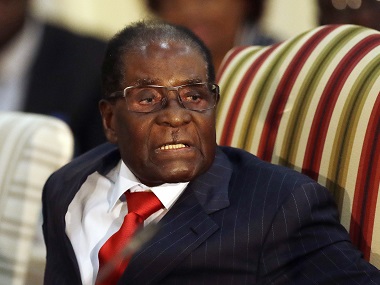Robert Mugabe, the 93-year-old African leader who ruled Zimbabwe for 37 years was fired by the ruling party, the Zimbabwe African National Union-Patriotic Front (ZANU-PF), and his wife, Grace Mugabe, was expelled from the party for inciting division on Sunday.
Mugabe has been replaced by Emmerson Mnangagwa whose advent has brought a fresh breeze of emancipation and hope along with uncertainty about the political future of Zimbabwe. The Mugabe regime’s dismal record on human rights has been comparable to several contemporary despotic regimes in Africa, such as those of late Muammar Gaddafi (Libya) and Omar-al Bashir (Sudan).
His ouster will also send a warning to entrenched authoritarian rulers such as Yoweri Museveni in Uganda and Joseph Kabila in the Democratic Republic of Congo (DRC).
While people are busy celebrating the end of the oppressive regime in Zimbabwe, the new regime, with support from the army, will be constrained to manage transition towards durable civilian regime through the required democratic processes that offer due respect to judiciary, parliament, bureaucracy and other institutions in civil society.
The army has vowed to remove criminals surrounding Mugabe along with G40 faction led by Grace Mugabe. Strangely, the military takeover was preceded by a meeting between Zimbabwe’s General Constantino Chiwenga and the Chinese defence minister Chang Wanquan which has raised suspicion about the possibility of China flexing its muscles in Zimbabwe’s internal matters.
However, the exit of Mugabe has brought a tragic end to a career of a promising leader of the yesteryears. Indeed, Mugabe was a product of conflicting forces between an oppressive state dominated by the whites and black resistance movements in the then South Rhodesia. He was a part of a larger liberation movement that fought against invidious racial discrimination based on land-related laws. These laws allowed the minuscule European minority to control half of the productive land while forcing impoverished African peasants to stay in overcrowded townships in urban industrial centres.
As a student at the Fort Hare College (1949-51) in South Cape, Mugabe virtually grew up in the breeding ground of freedom fighters of the black elites in South Africa. Obviously, he was under the influence of African National Congress’s Youth League known for producing famous leaders like Nelson Mandela, Walter Sisulu, Oliver Tambo and Robert Sobukwe.
He also taught in Ghana in the 1950s while it was going through the last phase of its freedom struggle. Besides, Indian leaders such as Mahatma Gandhi and Jawaharlal Nehru had influenced him. Mugabe threw himself into the freedom struggle and was jailed in 1964. He escaped jail in 1975 to flee to Mozambique, where he gathered support for a guerrilla struggle that he was leading under ZANU.
Eventually, after the formation of the Patriotic Front (PF) between ZANU and Zimbabwe African Peoples’ Union (ZAPU) led by Joshua Nkomo, Zimbabwe earned its independence through a negotiated settlement and Mugabe was saddled in power as the PF won a massive victory in polls.
Mugabe remained the prime minister from 1980-87 but due to differences with ZAPU; Nkomo had withdrawn support for Mugabe. Mugabe enjoyed a great deal of support from the Shona ethnic group that constituted seventy percent of the population and his regime was seldom under threat in those days in spite of several developmental problems.
After 1987, as Mugabe became president, the ZANU regime turned increasingly oppressive, inefficient and corrupt. Mugabe’s militias were attacking white farms. Mugabe held a referendum on a new constitution in 2000, that envisaged a crackdown on white farms, without giving owners the requisite compensations. He lost in the referendum and a newly formed opposition group, Movement for Democratic Change (MDC) was born.
In the 2008 elections, Mugabe came second in the first round but subsequently managed violent attacks on his opponents from the MDC and stayed on in power. In 2009, owing to hyperinflation and the overall dismal performance of the economy, Zimbabwe had to go for demonetisation. In 2016, Zimbabwe introduced bond notes due to a cash shortage.
The Mugabes have allegedly amassed properties in South Africa, Hong Kong, Singapore and Malaysia. Grace allegedly orchestrated the ouster of vice-president Joice Mujuru in 2014 and her successor Emmerson Mnangagwa in 2017 as she was already entertaining dreams of succeeding Mugabe. In substance, economic chaos, social instability and ascent of corrupt and criminal elements in the corridors of power had led to political turmoil.
In spite of this, the Mugabe regime could survive due to the supportive role played by China. China had supported ZANU-PF, militarily, since its freedom struggle. Owing to gross violation of human rights, when the United States and European Union (EU) imposed sanctions against Zimbabwe after the 2002 elections, China stepped in to support 100 development related projects in Zimbabwe. Beijing went ahead and blocked any move to impose arms embargo at the United Nations Security Council (UNSC) against Zimbabwe.
By 2015, China was the top trading partner of Zimbabwe, absorbing 28 percent of its export. China has had extensive investments in mining, agriculture, energy and construction sectors in Zimbabwe. China’s support for the construction of the Parliament building in Harare and purchase of European farms by the Chinese only underlines China’s overwhelming presence in the economy of Zimbabwe.
Evidently, China is concerned about the ‘indigenisation law’ that aims at seizing foreign-owned businesses and companies. In view of its high stakes, China has been monitoring infighting in Zimbabwe. It has neither condemned nor opposed the removal of the Mugabe regime.
Nevertheless, after the unceremonious ouster of Mugabe, the Mnangagwa regime will be compelled to clear the mess of the preceding régime by taking people of Zimbabwe as well as China into confidence.
The author is president, GB Pant Social Science Institute, and founder vice-chancellor of the Central University of Allahabad.

